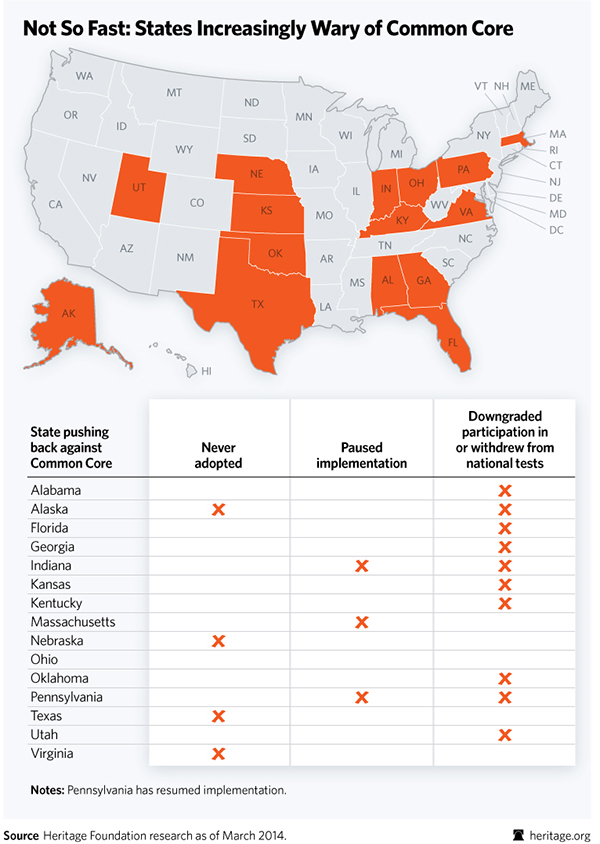The Indiana Senate passed a bill on Wednesday that will remove the state from the Common Core national standards. The bill, which was already passed by the House, is now headed to Governor Mike Pence’s (R) desk for signature.
The bill requires the state board to adopt Indiana “college and career readiness educational standards” by July 1, 2014, voiding the Common Core standards. It also requires the state of Indiana to “meet national and international benchmarks for college and career readiness standards and be aligned with postsecondary educational expectations” and “maintain Indiana sovereignty.”
Governor Pence paused the Common Core last May, stating:
I have long believed that education is a state and local function and we must always work to ensure that our students are being taught to the highest academic standards and that our curriculum is developed by Hoosiers, for Hoosiers.
Indiana’s original state standards were among the highest ranking in the nation. Exiting the Common Core will allow Indiana to either use their former standards, which were among some of the best in the country, or to pursue other innovative paths using an array standards supplementing what they once had in place.
While the move to exit Common Core was an important one, there is an ongoing debate in the state about what will replace the national standards and whether what is being proposed is Common Core-lite. As Heritage’s Alicia Cohn reported for The Foundry: “Common Core opponents suspect a bias toward it already was embedded in the review process. With Iowa, Florida, and Arizona renaming their own state standards to avoid the tainted Common Core branding, critics have reason to suspect Indiana might end up doing the same thing.”
Indiana’s bill also adds a requirement that the new state standards should prepare students adequately for the ACT and SAT college entrance examinations. But with news this week that the SAT is being revamped in part to reflect Common Core, real questions have been raised about the impact this will have on states like Indiana that are working to reclaim their standards-setting autonomy.
In addition to Indiana, 15 states to date have withdrawn from the federal testing consortium, downgraded their involvement, paused implementation of the standards, or introduced measures against the standards.
Utah led the way in state push-back, withdrawing from the Common Core–aligned, federally funded Smarter Balanced Assessment Consortium (SBAC) in August 2012 and opting for its own tests, keeping testing control within the state. Utah’s actions were followed by Indiana when Pence halted implementation of the standards to allow the Hoosier State to assess the cost to taxpayers and the quality of the content. Pennsylvania also hit the pause button on the standards last year, as did Massachusetts, providing an opportunity for a closer examination of the quality of the standards.
Alaska and Kentucky joined push-back in January.
Alaska never formally adopted the standards but joined SBAC in April 2013 in an advisory state capacity. But less than one year later, America’s Last Frontier became one of the first states to drop the national tests entirely in favor of developing its own testing options. Kentucky announced its withdrawal from Common Core–aligned, federally funded Partnership for Assessment of Readiness for Colleges and Careers tests shortly after the Alaska decision.
Kentucky and New York were two of the first states to have implemented Common Core fully. New York saw its test scores plummet, and Kentucky was forced to discontinue scoring of all “constructed-response questions” in each of the four Common Core high school end-of-course exams.
Common Core proponents are scrambling to keep the coalition together as local actors have to deal with the task of implementation. The one-size-fits-all national standards approach has created massive centralization of education in America with clearly laid federal fingerprints. In the last stretch toward the implementation deadline, states and parents are reclaiming control over their tests and questioning the quality of the standards. Indiana’s actions put them at the head of this class and will allow their excellent state standards to guide public education in the Hoosier State.































